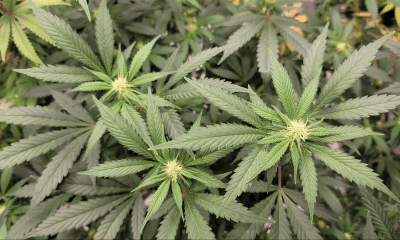Politics
South Dakota Police File Lawsuit To Overturn Voter-Passed Marijuana Measure

Two law enforcement officials in South Dakota are asking a judge to throw out a marijuana legalization measure that state voters approved this month, filing a court challenge that appears to have the backing of Gov. Kristi Noem (R) and is being paid for at least partially with state funds.
Pennington County Sheriff Kevin Thom and state Highway Patrol Superintendent Col. Rick Miller sued on Friday. The lawsuit seeks to declare all ballots cast for or against Amendment A null and void and invalidate the changes it makes to the state Constitution.
“I’ve dedicated my life to defending and upholding the rule of law,” Thom said in a press release. “The South Dakota Constitution is the foundation for our government and any attempt to modify it should not be taken lightly. I respect the voice of the voters in South Dakota, however in this case I believe the process was flawed and done improperly, due to no fault of the voters.”
The challenge, filed in state’s Sixth Judicial Circuit Court, attempts to overturn Amendment A, which won just over 54 percent of the vote on Election Day, on what some might see as a technicality. It claims that because the marijuana legalization question, a constitutional amendment, covers multiple issues—including the legalization and regulation of marijuana for adults 21 and older, as well as the regulation of medical cannabis and hemp—it violates a 2018 requirement that “no proposed amendment may embrace more than one subject.”
In all, the challenge claims the constitutional amendment contains at least five distinct subjects involving the legalization and regulation of various forms of cannabis. Rather than package those subjects into a single proposed amendment, the challenge argues, organizers needed to split them into separate questions on the ballot.
“A major purpose of the one-subject rule is to avoid requiring voters to accept part of a proposed amendment that they opposed in order to obtain a change in the Constitution that they support,” the complaint says, “resulting in votes that do not accurately reflect the electorate’s approval of the proposed amendment.”
A challenge along similar lines removed a medical marijuana legalization measure from Nebraska’s ballot in September, when the Nebraska Supreme Court ruled that the proposed constitutional amendment violated that state’s single-issue rule.
South Dakota has had the single-subject requirement in place since voters passed a 2018 constitutional amendment on the issue.
“Our constitutional amendment procedure is very straightforward,” said Miller of the South Dakota Highway Patrol. “In this case, the group bringing Amendment A unconstitutionally abused the initiative process. We’re confident that the courts will safeguard the South Dakota Constitution and the rule of law.”
The law enforcement officials’ complaint also argues that the legalization measure was not properly constitutionally ratified. “The proponents of Amendment A failed to follow that basic textual requirement,” their press release says.
The group behind the South Dakota legalization measure said over the weekend that its legal team is reviewing the lawsuit and developing a strategy that it will share soon.
“We are prepared to defend Amendment A against this lawsuit,” South Dakotans for Better Marijuana Laws said in a statement. “Our opponents should accept defeat instead of trying to overturn the will of the people. Amendment A was carefully drafted, fully vetted, and approved by a strong majority of South Dakota voters this year.”
The group said it will be moving to formally intervene in the lawsuit this week, which it said was “filed incorrectly under South Dakota law, as a ‘contest’ to an election.”
“The complaint has nothing to do with the manner in which the election was conducted and only relates to the text of Amendment A,” the pro-legalization organization said of the single-subject dispute. “But anyone who reads Amendment A can see that every word relates to the cannabis plant.”
The police lawsuit’s claims on procedural grounds are a “manufactured distinction” that is “unsupported in the law and is utterly insufficient as a basis for overturning a constitutional amendment approved by voters,” South Dakotans for Better Marijuana Laws said.
State money is funding an unspecified portion of the lawsuit, the Rapid City Journal reported on Friday, citing a spokesperson for Noem. “The governor approved this because she took an oath to support and defend the Constitution. This is part of her duty as governor,” Ian Fury told the paper.
Private lawyers are representing the officials.
In the days after the election, the governor said she “was personally opposed to these measures and firmly believe they’re the wrong choice for South Dakota’s communities.”
“We need to be finding ways to strengthen our families,” Noem said, “and I think we’re taking a step backward in that effort.”
In a statement to the Rapid City Journal on Friday, she said she’s eager to see the challenge go to court.
“In South Dakota we respect our Constitution,” Noem said. “I look forward to the court addressing the serious constitutional concerns laid out in this lawsuit.”
The case doesn’t seek to challenge the separate statutory medical cannabis ballot measure that voters also approved this month.
A handful of other legal challenges are in the works across the U.S. after voters approved every major marijuana and drug reform measure on state ballots on Election Day.
In Mississippi, where voters legalized marijuana for medical use, the mayor of the city of Madison asked the state Supreme Court to invalidate the measure on procedural grounds, arguing it was improperly put before voters. But unlike in South Dakota, Mississippi state officials are siding with voters.
“Even if their interpretative argument is correct, petitioners’ action is woefully untimely,” says a filing made earlier this month by the secretary of state and attorney general, who are defending the law in court. “They could have asserted their so-called ‘procedural’ challenge years ago.”
State officials said the high court “should deny petitioners’ requested relief and dismiss their petition.”
In Montana, meanwhile, the group Wrong for Montana is suing to overturn a cannabis legalization measure passed by 56.9 percent of state voters. In that suit, plaintiffs argue the measure unconstitutionally involved the appropriation of state funds.
Separately, some Montana lawmakers had planned to undo the legalization law through a bill in the state legislature, but the leader of that effort, Rep. Derek Skees (R) backed away from that plan after noting the measure’s wide margin of victory.
“The only branch of government in this state dumb enough to overturn citizens’ initiative is the [state] Supreme Court, which has done it repeatedly,” he said.
Read the full lawsuit against South Dakota’s marijuana legalization law below:
South Dakota Marijuana Lawsuit by Marijuana Moment
Teen Marijuana Treatment Admissions Fell Sharply In States That Legalized, Federal Report Shows
Photo elements courtesy of rawpixel and Philip Steffan
















